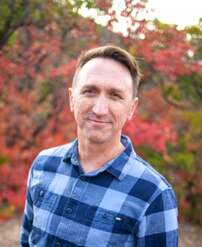Licensed Clinical Mental Health Counselor, Board Certified and EMDR Trained.

I've hit the jackpot with life. By that, I mean that everything hard in my life helped me to learn, grow and get stronger. And the life lottery started out quick! My bio-dad died in a motorcycle crash when I was 3 years old. From this tragedy, my Mom married my step-dad when I was six and we moved from the beaches of Del Mar, California, to a trailer court in the high desert of Southern Utah. I remember the drive because Tina, my cat, had kittens underneath the passenger seat of Mom's 1969 convertible Camaro on Interstate 15 around Bakersfield.
Growing up wasn't easy. The single-wide trailer that was heated by a wood burning stove in the winter and the overworked swamp cooler would often stop working, in the summer. I didn't realize how humble my up-bringing was until many years later because it was just normal to me. It was normal, having to stock-pile wood if I didn't want to freeze in the winters and I got pretty good at fixing swamp coolers in the summer. It was normal to run amok from sun up to sun down with your moms instruction being, "be home before dark!" It was even normal (I hope you're sitting down), to wander about all day without a water bottle!! Inside those years, a lot of tough lessons were learned that schooling could'nt teach - And because all the stories would never fit on this "about me" page, I hope they're enough to give you an idea of who I am today along with where I came from. If you're still unsure about me, go to the @jedsaidtherapy youtube channel where I've uploaded almost 300 free therapy videos or instagram where you'll find too many too count therapy memes.
Therapy starts with 2 things; connection and honesty. Having been trained in many styles of therapy I've found that, for me, being genuine is the quickest way to establish a connection. I believe that providing supportive and honest reflection at the appropriate time gives people the best opportunity for gaining awareness which can then be used to work through life struggles. Clients will often hear me say, 'do you want nice or honest?' Nice gives them the answer they want to hear (and have likely heard before from family and friends) while honest gives them something new to think about. At the end of the day, therapy is all about giving people the option to think differently. Thinking first - then feeling - then behaving.
My philosophy: You are not broken. People can change and many relationships can mend. Lastly, you are stronger and definitely more resilient than you realize.
Now, let's get to work.
Growing up wasn't easy. The single-wide trailer that was heated by a wood burning stove in the winter and the overworked swamp cooler would often stop working, in the summer. I didn't realize how humble my up-bringing was until many years later because it was just normal to me. It was normal, having to stock-pile wood if I didn't want to freeze in the winters and I got pretty good at fixing swamp coolers in the summer. It was normal to run amok from sun up to sun down with your moms instruction being, "be home before dark!" It was even normal (I hope you're sitting down), to wander about all day without a water bottle!! Inside those years, a lot of tough lessons were learned that schooling could'nt teach - And because all the stories would never fit on this "about me" page, I hope they're enough to give you an idea of who I am today along with where I came from. If you're still unsure about me, go to the @jedsaidtherapy youtube channel where I've uploaded almost 300 free therapy videos or instagram where you'll find too many too count therapy memes.
Therapy starts with 2 things; connection and honesty. Having been trained in many styles of therapy I've found that, for me, being genuine is the quickest way to establish a connection. I believe that providing supportive and honest reflection at the appropriate time gives people the best opportunity for gaining awareness which can then be used to work through life struggles. Clients will often hear me say, 'do you want nice or honest?' Nice gives them the answer they want to hear (and have likely heard before from family and friends) while honest gives them something new to think about. At the end of the day, therapy is all about giving people the option to think differently. Thinking first - then feeling - then behaving.
My philosophy: You are not broken. People can change and many relationships can mend. Lastly, you are stronger and definitely more resilient than you realize.
Now, let's get to work.
Podcasts: To book a podcast interview with Jed, contact him directly on the main line or send email to [email protected]
|
The Naked Patient w/ Dr. Nicholas Howland = August 31st, 2022
|
Belief Cast w/Todd Sylvester
March 26th, 2018 |
Podcast w/ Jon Gossett
January 17th, 2022 |

What a wonderful thought it is that some of the best days of our lives haven't happened yet.
Proudly powered by Weebly